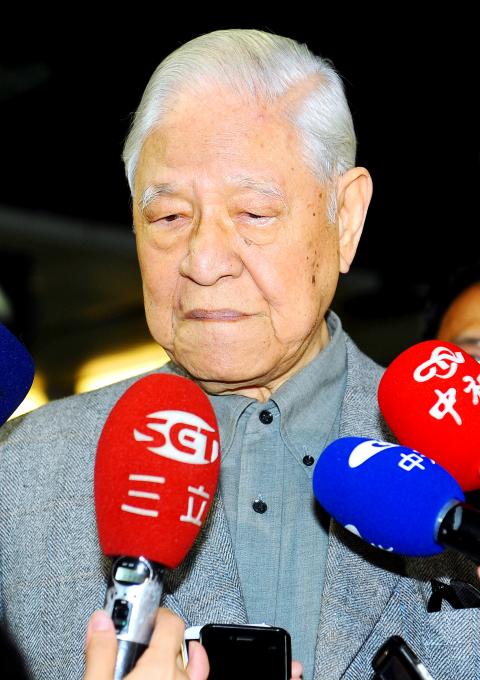Former president Lee Teng-hui (李登輝) yesterday called on President Ma Ying-jeou (馬英九) and Legislative Speaker Wang Jin-pyng (王金平) to take positive steps to ease tensions triggered by the ongoing student-led protest at the Legislative Yuan, including convening a citizens’ constitutional conference.
Wang, as speaker, should visit the students in the legislative chamber and initiate unofficial dialogues by offering his personal views and by listening to what the students have to say, Lee said at the Taipei High-Speed Rail Station in response to reporters’ questions.
Ma should do the same, the 91-year-old Lee said.

Photo: Chang Chia-ming, Taipei Times
Leaders should always have compassion and the patience to explain to the public whatever they do not understand, he said.
Student protesters should not be seen as rioters and those people who want their voices to be heard should not be labeled as “bad citizens,” Lee said as his eyes began to fill with tears.
Lee also questioned the government’s decision to use riot police to evict the students who had tried to occupy the Executive Yuan, saying the students were “very sympathetic.”
At one point, Lee became emotional and had to pause for a few moments before he could talk again.
Citing his experience in handling the “Wild Lily” student movement in 1990, in which student protesters demanded legislative reforms, Lee said he met with the protest leaders, telling them what he could do and could not do, and later organized a national affairs conference to develop a reform agenda.
The former president encouraged Ma and Wang to take the same active approach to resolve the long-running controversy over the cross-strait service trade agreement, which was signed in June last year.

INVESTIGATION: The case is the latest instance of a DPP figure being implicated in an espionage network accused of allegedly leaking information to Chinese intelligence Democratic Progressive Party (DPP) member Ho Jen-chieh (何仁傑) was detained and held incommunicado yesterday on suspicion of spying for China during his tenure as assistant to then-minister of foreign affairs Joseph Wu (吳釗燮). The Taipei District Prosecutors’ Office said Ho was implicated during its investigation into alleged spying activities by former Presidential Office consultant Wu Shang-yu (吳尚雨). Prosecutors said there is reason to believe Ho breached the National Security Act (國家安全法) by leaking classified Ministry of Foreign Affairs information to Chinese intelligence. Following interrogation, prosecutors petitioned the Taipei District Court to detain Ho, citing concerns over potential collusion or tampering of evidence. The

‘FORM OF PROTEST’: The German Institute Taipei said it was ‘shocked’ to see Nazi symbolism used in connection with political aims as it condemned the incident Sung Chien-liang (宋建樑), who led efforts to recall Democratic Progressive Party (DPP) Legislator Lee Kun-cheng (李坤城), was released on bail of NT$80,000 yesterday amid an outcry over a Nazi armband he wore to questioning the night before. Sung arrived at the New Taipei City District Prosecutors’ Office for questioning in a recall petition forgery case on Tuesday night wearing a red armband bearing a swastika, carrying a copy of Adolf Hitler’s Mein Kampf and giving a Nazi salute. Sung left the building at 1:15am without the armband and apparently covering the book with a coat. This is a serious international scandal and Chinese

Seventy percent of middle and elementary schools now conduct English classes entirely in English, the Ministry of Education said, as it encourages schools nationwide to adopt this practice Minister of Education (MOE) Cheng Ying-yao (鄭英耀) is scheduled to present a report on the government’s bilingual education policy to the Legislative Yuan’s Education and Culture Committee today. The report would outline strategies aimed at expanding access to education, reducing regional disparities and improving talent cultivation. Implementation of bilingual education policies has varied across local governments, occasionally drawing public criticism. For example, some schools have required teachers of non-English subjects to pass English proficiency

TRADE: The premier pledged safeguards on ‘Made in Taiwan’ labeling, anti-dumping measures and stricter export controls to strengthen its position in trade talks Products labeled “made in Taiwan” must be genuinely made in Taiwan, Premier Cho Jung-tai (卓榮泰) said yesterday, vowing to enforce strict safeguards against “origin laundering” and initiate anti-dumping investigations to prevent China dumping its products in Taiwan. Cho made the remarks in a discussion session with representatives from industries in Kaohsiung. In response to the US government’s recent announcement of “reciprocal” tariffs on its trading partners, President William Lai (賴清德) and Cho last week began a series of consultations with industry leaders nationwide to gather feedback and address concerns. Taiwanese and US officials held a videoconference on Friday evening to discuss the